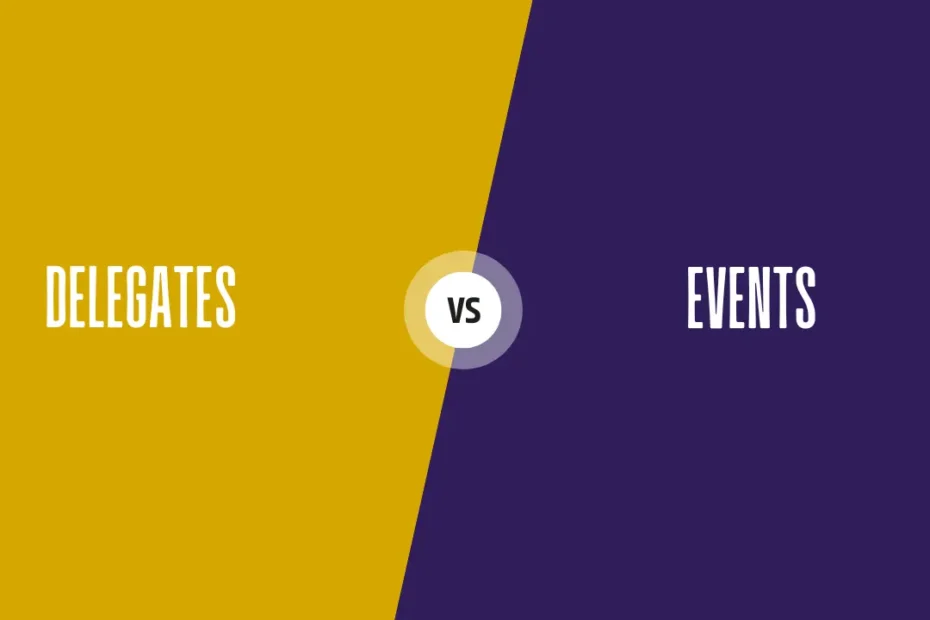In C#, both delegates and events are mechanisms used to implement the publisher-subscriber pattern, enabling communication and notification between objects. However, they serve different purposes and have distinct features. Let’s explore the key difference between delegates and events in C#:
Difference Between Delegates and Events in C#
Delegates:
- Definition:
- A delegate is a type that references methods with a specific signature. It acts as a function pointer or a reference to a method, allowing you to call the method indirectly through the delegate.
- Usage:
- Delegates are primarily used for creating callback mechanisms or implementing the observer pattern. They allow you to pass methods as parameters to other methods or store them as variables, making it easy to decouple the calling code from the implementation of the method.
- Syntax:
- Declaring a delegate involves specifying the return type and the parameter list of the method signature it can reference. The delegate instance is created by specifying the method name or using lambda expressions.
- Single vs. Multicast:
- Delegates can be single-cast or multicast. Single-cast delegates point to a single method, while multicast delegates can point to multiple methods. Multicast delegates are created by using the
+or+=operator to combine multiple delegate instances.
- Delegates can be single-cast or multicast. Single-cast delegates point to a single method, while multicast delegates can point to multiple methods. Multicast delegates are created by using the
- Invocation:
- Delegates are invoked using the
Invoke()method explicitly or, more commonly, through direct invocation using the delegate instance as if it were a method.
- Delegates are invoked using the
Events:
- Definition:
- An event in C# is a notification mechanism that allows objects to notify other objects of changes in state. Events are typically used to implement a publish-subscribe pattern, where objects that are interested in changes in state can subscribe to an event and be notified when the event is raised.
- Usage:
- Events are used to enable the observer pattern with greater encapsulation. They allow objects (publishers) to notify other objects (subscribers) when something of interest happens without exposing direct access to the delegate.
- Syntax:
- Events are declared using the
eventkeyword and are associated with a delegate type. The event declaration typically follows a convention of using theEventHandlerdelegate or custom delegates that have a specific signature for event handling.
- Events are declared using the
- Adding and Removing Subscribers:
- Events expose add (
+=) and remove (-=) accessors that allow subscribers to register and unregister their event handlers. Only the owning class can raise (invoke) the event, ensuring that subscribers cannot inadvertently trigger the event.
- Events expose add (
- Invocation:
- Events can only be raised (invoked) from within the class that defines them. This means that subscribers can’t directly invoke the event; they can only respond to it when the event is raised by the publisher.
Examples
Here is an example of how to use a delegate in C#:
public delegate void MyDelegate(string message);
public class MyClass
{
public void DoSomething(string message)
{
// Do something with the message.
}
public void RaiseEvent(string message)
{
// Create a delegate that refers to the DoSomething() method.
MyDelegate delegate = DoSomething;
// Invoke the delegate with the message.
delegate(message);
}
}
In this example, the MyDelegate delegate is used to represent a reference to the DoSomething() method. The RaiseEvent() the method then uses the MyDelegate delegate to invoke the DoSomething() the method with the specified message.
Here is an example of how to use an event in C#:
public class MyClass
{
public event MyDelegate MyEvent;
public void DoSomething(string message)
{
// Do something with the message.
}
public void RaiseEvent(string message)
{
// Notify listeners of the change in state.
MyEvent?.Invoke(message);
}
}
In this example, the MyEvent event is used to notify listeners of changes in state. The MyEvent event can be used to notify any object that has subscribed to it.
Conclusion
In summary, delegates are used for defining method signatures and creating callback mechanisms, while events build on delegates to provide a more controlled and encapsulated way of implementing the publisher-subscriber pattern. Events are the preferred choice when you want to provide notification mechanisms between objects while maintaining proper encapsulation and control over event registration and invocation.
